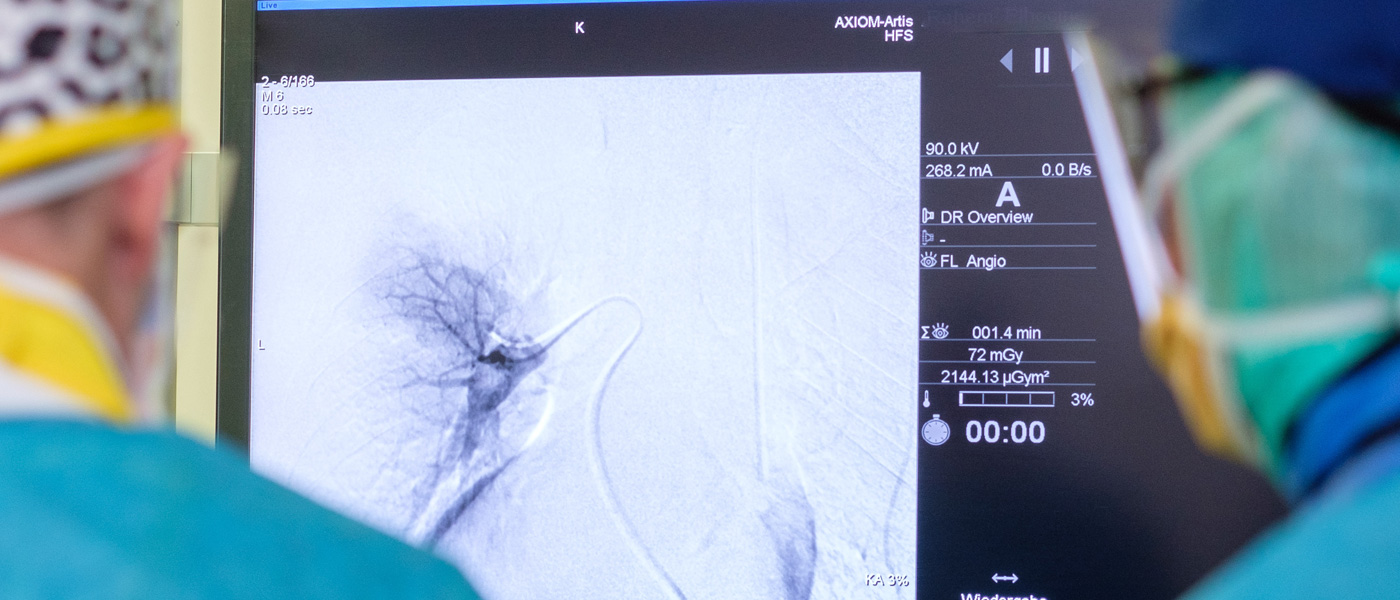Radiofrequency-Tumor Ablation
Dear Patients
In the following pages you will find information about radiofrequency tumor ablation.
The radiofrequency tumor ablation is a minimal invasive treatment method for primary and secondary lung tumors. In this method a special needle is placed subcutaneously into the tumor under the guidance of CT. Through this a heat wave can be created at the tip of the needle using an electric current which results in heating of the tumor tissue around the tip of the needle leading to its destruction.
What are the other treatment options for lung tumors?
Basically there are different types of treatment methods for lung tumors depending on the type and stage of the disease: on the one hand is the surgical resection of the involved lobe of the lung or removal of the whole lung in severe cases. On the other hand is the option of chemotherapy. Moreover, radiation therapy may be required which is done at the radiation therapy unit.
What types of lung tumors are suitable for radiofrequency ablation?
This form of treatment is mostly used for primary lung tumors (bronchial carcinoma) but is also used in treatment of lung metastases like e.g., from breast cancer or intestinal cancer.
What are the advantages of radiofrequency ablation?
With this therapy it is possible to preserve more functional lung tissue in patients with lung tumors as can be saved by surgical resection. Hence this improves the life quality of the patient in cases of compromised lung capacity.
What are the possible complications?
Different types of complications can arise depending on the type, size and localisation of the tumor. There is the possibility of bouts of cough, bleeding or the so called pneumothorax where air collects in the space between the lung and chest wall. Normally there is negative pressure in this space and results in compression of the lung when there is change in this pressure which must be reversed using a special catheter so that the lung is normally aerated. In such cases the patients must remain in the hospital for observation.
Are there contraindications for the use of this therapy?
The possibility of application of this therapy depends on the tumor size. Because of the technical restriction it is not possible to treat tumor of very big sizes. On the other hand the tumors must have a certain size because it is not possible to sufficiently treat the smallest of tumors at microscopic levels. This means that there is a possibility of tumor recurrence.
What technical equipments are necessary for radiofrequency ablation?
For this method of treatment we require special needle-electrodes and an electrical generator for generation of energy.
Performing a radiofrequency ablation
In most of the cases the radiologist chooses the more patient friendly percutaneous entry which means a needle is inserted through the skin at the level where the therapy is to be done. The advantage of this method is that it is associated with little complications and that only a local anaesthesia is required.
After administration of local anaesthesia a small incision of about 2 mm is made. Simultaneously the patient is given a light sedative intravenously. Under CT-guidance the needle is slowly pushed forward to the region of interest which is then followed by radiofrequency ablation; heating of tumor cells. In case of tumor recurrence the radiofrequency ablation can be repeated.
How does the therapy take?
The treatment takes about 30 minutes to 1 hour depending on the number and location of the tumors.
How is the success of therapy checked?
A regular follow-up is done in form of CT or MRI examinations every three months to make sure that the whole tumor tissue has been destroyed. In this process reemergence of new tumors can be detected and treated again.
